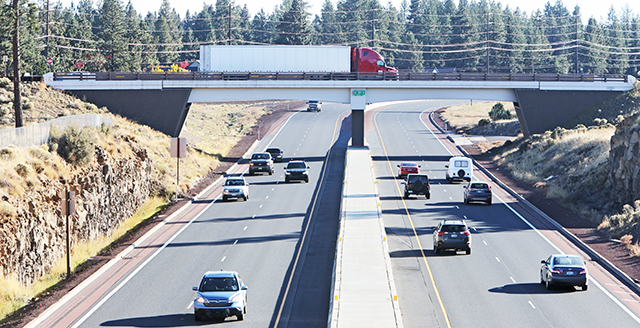Bend City Council has decided to allocate $18 million in taxpayer bond funding to tackle traffic congestion on Empire Avenue, leaving several other proposed projects without financial support. This decision highlights ongoing funding challenges and the city’s prioritization of addressing immediate transportation needs over broader infrastructure improvements.
The council’s recent vote consolidates resources to focus on Empire Avenue, a crucial east-west route experiencing increased traffic due to significant housing growth in northeast Bend. While plans for new highway ramps at Murphy Crossing and other projects will be sidelined, engineers from the city and the Oregon Department of Transportation (ODOT) are exploring potential solutions for Empire Avenue’s congestion. Options under consideration include stoplight upgrades, turn lane additions, and even a new highway connection.
Rising costs and state funding issues have complicated Bend’s transportation planning. A recent bill passed during the state legislative session in September provided essential funding for road maintenance but did not allocate resources for new construction projects. The last significant state transportation package was passed in 2017, which funded a $191 million highway reconstruction project in north Bend, completed in December.
Omar Ahmed, area manager at ODOT, remarked, “Our funding never materialized over the last five years,” which reflects the ongoing financial strain on infrastructure projects. The city had anticipated more state funding, which led to the initial allocation of nearly $18 million for five key projects aimed at improving parkway access.
The situation along Empire Avenue is particularly pressing. The ongoing housing boom has resulted in a surge of vehicles, exacerbating congestion where Empire intersects with U.S. Highway 20. Ahmed noted that traffic is becoming increasingly problematic along the parkway, including at sites where funding has now been redirected.
With the consolidation of funds, the city has also postponed several projects. A proposed $3 million frontage road at the Butler Market Road exit and a $430,000 investment for a signal or roundabout near Colorado Avenue are now unfunded. Notably, the intersection at Powers Road, the only remaining traffic signal on the parkway, faces a $2.6 million setback. Plans for an overcrossing or interchange at this location have also been stalled.
The project at Murphy Road presents another challenge. Although the state constructed an overcrossing in 2016, funding fell short for additional ramp access. Currently, the city has set aside $10 million in bond funds, yet ODOT estimates the total cost for completing the ramps could reach $20 million to $25 million.
City Engineer Ryan Oster expressed concerns about funding availability, stating, “We’re just not in a world right now where ODOT has $10 million to $15 million to throw at the Murphy Crossing.” The situation necessitates careful management of available resources.
On a more optimistic note, ODOT has earmarked $5.5 million specifically for improvements on Empire Avenue. This funding could facilitate short-term fixes, such as adding a right turn lane and upgrading the existing traffic signal to alleviate congestion.
Prior to the consolidation of funds, the city had already allocated approximately $1.4 million for an ODOT initiative to widen Empire to five lanes. Ahmed indicated that additional intermediate projects may be pursued as funding permits.
The need for a more extensive long-term solution has been recognized, particularly the possibility of constructing a direct connection from Highway 20 to the parkway. This concept has been under discussion for decades but has faced challenges related to cost and complexity. Ahmed noted that ODOT currently lacks a solid cost estimate for this potential project.
City Councilor Ariel Méndez emphasized the importance of addressing congestion through alternative transportation methods rather than simply expanding roadways. He advocates for increased bicycle and public transport usage, asserting, “If all we do is focus on prioritizing driving, that’s only going to work in the short run.”
The city has utilized about one-third of the general obligation bond funding approved by voters in 2020. This bond has financed numerous road projects aimed at enhancing traffic flow and safety. Recently, the city was notified of a $32 million federal grant for a railroad overcrossing on Reed Market Road, allowing for reallocation of approximately $20 million in bond funds to cover cost overruns on other projects.
Despite broader cuts to federal transportation funding, Oster remains hopeful that the grant for Reed Market will be maintained. “We’re planning on the funding coming through,” he stated, although he acknowledged the unpredictability of future financial developments.
As Bend navigates these funding challenges, the focus remains on addressing immediate transportation needs while considering long-term strategies to accommodate the city’s growth.
